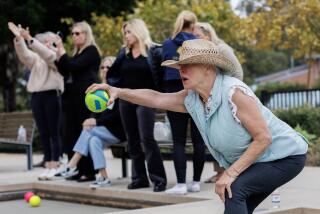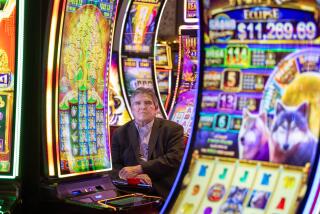Big Pot Rides on Suit Over Asian Games
- Share via
BELL GARDENS — If city officials in this working-class town seem a bit giddy these days, it’s understandable.
The city has been banking money at a phenomenal rate, thanks to the success of the Bicycle Club card casino and a Chinese betting game called pai gow (pronounced PIE-gow). When the $20-million club, complete with a gourmet restaurant, pastry shop and beauty salon, opened in November, 1984, city officials talked cautiously of receiving $1 million a year from the venture.
They were wrong. In its first year, the club delivered $2 million to the city, and in fiscal 1987-88 officials project the city’s share of club revenues to top $7.4 million--almost as much as the entire city budget five years ago.
Much of the windfall is the result of pai gow and variations of the complex betting game that are being played at the Bicycle Club and other Southeast-area casinos. Nearly 67% of the city’s share of club revenues this year is projected to come from pai gow or other Asian games, said David Bass, Bell Gardens finance director.
But the pot at the end of the pai gow rainbow could evaporate depending on the outcome of a lawsuit that may go to trial as early as this week in Los Angeles Superior Court. The crux of the suit--originally brought by the Los Angeles County Sheriff’s Department against the card clubs--centers on whether pai gow is a banking game, which is illegal in California.
In traditional pai gow, one player acts as the house, betting against others in the game. According to century-old California law, when one player bets against more than one player, it is considered a “banking” game because the individual is essentially acting as the house or bank.
When pai gow, played with 32 domino-like tiles, first surfaced in the clubs in early 1985, deputies tried to shut it down. Lawsuits were filed then, but the case on the game’s legality is only now ready for trial.
Meanwhile, casinos and cities like the Bicycle Club and Bell Gardens have profited from the high-stakes game that initially attracted mostly Asians, but now has a growing Caucasian following. Some versions of the game, including pai gow poker, which uses a regular deck of cards, have also become quite popular.
“There’s no question that pai gow helped us get off (to) a fast start,” said George Hardie, the general manager of Bicycle Club, which employs more than 1,000 workers around the clock. “We have such a huge overhead, and those games kept the revenue stream flowing.”
For Bell Gardens, a city with a host of needs, the revenue has afforded a rare chance to attract new development. In the last two years, the city has bought 6 1/2 acres of land east of the club for a hotel and office development. And there are plans for a 16-acre shopping center north of the club at Eastern and Florence avenues, the largest retail project every undertaken in the city.
“We’ve been awfully lucky,” Bass said. “It made life around here real easy.”
More to Read
Sign up for Essential California
The most important California stories and recommendations in your inbox every morning.
You may occasionally receive promotional content from the Los Angeles Times.













